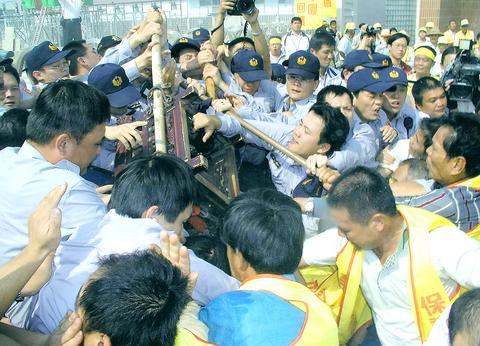A series of protests against waste incinerators across Taiwan yesterday highlights the contentiousness of the Environmental Protection Administration's (EPA) policy review relating to waste management .
In the south of Kaohsiung County, more than 200 residents of Taliao Township protested yesterday morning against a medical waste incinerator in the Tafa industrial complex, where an average of 90 tonnes of medical waste, collected from 82 hospitals and 2,182 clinics, is burnt every month.
The egg-throwing demonstrators said they often smelt a foul odor because the incinerator spewed out excessive pollutants.

PHOTO: WU JEN-CHIEN, TAIPEI TIMES
They said the dioxin concentration tested earlier this month was much higher than the limit stipulated in new regulations to apply from next year.
"The concentration of dioxin is 203 times the acceptable level. So does the government think our lives are worthless?" Taliao township chief Huang Tien-huang (
The protesters later appealed to Kaohsiung County Commissioner Yang Chiu-hsing (
Yang said however that the operators of the incinerator would be punished if they failed to meet the standards by next year.
According to the incinerator's operators, the plant has been closed since Tuesday for renovations.
Meanwhile, in Taichung County, more than 300 residents of Wujih Township protested against a newly-completed NT$4.5 billion incinerator.
Carrying a deity, demonstrators tried to forcibly enter the plant but were stopped by police.
Unlike Kaohsiung, the Wujih protesters said they would accept the incinerator as long as they were suitably compensated.
Environmental officials from the Taichung County government said NT$19 million would be allocated to local construction projects.
They said the incinerator was being tested and would not be officially launched until early next year.
The demonstrations were augmented by protests in front of the EPA in Taipei yesterday afternoon. Dozens of activists from environmental groups took part, saying that unsettled disputes over incinerators required an immediate change of policy.
Citing the example of an incinerator under construction in Miaoli County's Chunan Township, activists said the government should first improve the current recycling rate of 3 percent rather than rely on incineration.
"We don't want a cent from the government and we will hold a referendum next month to express our strong opposition," said Hsu Ming-sung (許明松), an anti-incinerator activist from Miaoli.
Representatives of Chichi Township in Nantou County said that the result of their referendum clearly expressed their opposition against the incinerator project.
The result was sent to related agencies, including the Cabinet, the EPA, the Nantou County Government and the township office.
"If our opinions can't be taken seriously even now, then we might file a lawsuit against the government based on environmental laws," said Tsai Yuan-chou (
Demonstrators had presented a petition asking new EPA chief Chang Juu-en (
"In this report, the EPA is still sticking with using incinerators. So what else is new?" said Hsieh Herlin (
EPA officials said the analysis recommended several policy adjustments, after taking into account earlier criticism from several sources, including residents, legislators and environmentalists.

Alain Robert, known as the "French Spider-Man," praised Alex Honnold as exceptionally well-prepared after the US climber completed a free solo ascent of Taipei 101 yesterday. Robert said Honnold's ascent of the 508m-tall skyscraper in just more than one-and-a-half hours without using safety ropes or equipment was a remarkable achievement. "This is my life," he said in an interview conducted in French, adding that he liked the feeling of being "on the edge of danger." The 63-year-old Frenchman climbed Taipei 101 using ropes in December 2004, taking about four hours to reach the top. On a one-to-10 scale of difficulty, Robert said Taipei 101

Taiwanese and US defense groups are collaborating to introduce deployable, semi-autonomous manufacturing systems for drones and components in a boost to the nation’s supply chain resilience. Taiwan’s G-Tech Optroelectronics Corp subsidiary GTOC and the US’ Aerkomm Inc on Friday announced an agreement with fellow US-based Firestorm Lab to adopt the latter’s xCell, a technology featuring 3D printers fitted in 6.1m container units. The systems enable aerial platforms and parts to be produced in high volumes from dispersed nodes capable of rapid redeployment, to minimize the risk of enemy strikes and to meet field requirements, they said. Firestorm chief technology officer Ian Muceus said

MORE FALL: An investigation into one of Xi’s key cronies, part of a broader ‘anti-corruption’ drive, indicates that he might have a deep distrust in the military, an expert said China’s latest military purge underscores systemic risks in its shift from collective leadership to sole rule under Chinese President Xi Jinping (習近平), and could disrupt its chain of command and military capabilities, a national security official said yesterday. If decisionmaking within the Chinese Communist Party has become “irrational” under one-man rule, the Taiwan Strait and the regional situation must be approached with extreme caution, given unforeseen risks, they added. The anonymous official made the remarks as China’s Central Military Commission Vice Chairman Zhang Youxia (張又俠) and Joint Staff Department Chief of Staff Liu Zhenli (劉振立) were reportedly being investigated for suspected “serious

Nipah virus infection is to be officially listed as a category 5 notifiable infectious disease in Taiwan in March, while clinical treatment guidelines are being formulated, the Centers for Disease Control (CDC) said yesterday. With Nipah infections being reported in other countries and considering its relatively high fatality rate, the centers on Jan. 16 announced that it would be listed as a notifiable infectious disease to bolster the nation’s systematic early warning system and increase public awareness, the CDC said. Bangladesh reported four fatal cases last year in separate districts, with three linked to raw date palm sap consumption, CDC Epidemic Intelligence